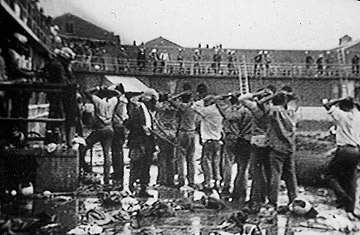
A video image of prisoners being rounded up after the fourth day of inmate rioting at the Attica Correctional Facility on May 2, 1971
Before he becomes a forgotten footnote in Aung San Suu Kyi's biography, it's worth pausing to consider the price John Yettaw is about to pay for his unauthorized nighttime swim. On Aug. 11, Yettaw, 53, was sentenced to seven years in a Burmese prison for donning a pair of flippers and paddling across a lake to the Rangoon home of Suu Kyi, the prodemocracy dissident and Nobel laureate. (Suu Kyi received an additional 18 months of house arrest for violating the terms of her sentence by sheltering the Missouri native.) Seven years is a stiffer sentence than many had expected for Yettaw, who is said to suffer mental problems. Even worse: four of those years will consist of "hard labor" — a punishment whose severity shouldn't go underrated.
Disciplining wrongdoers with arduous physical activity stretches as least as far back as the ancient Greeks — and it's always really sucked. Homer's Odyssey recalls the plight of Sisyphus, the Corinthian King consigned to nudging a boulder up a hill for all eternity; according to the gods' twisted decree, when he neared the top of the hill, the rock would come tumbling down. Rehabilitation in 19th century England took a page from the Greeks' prescription for soul-crushing drudgery: inmates would be forced to trek endlessly on treadmills, pass their days turning purposeless cranks for thousands of revolutions at a time, or shuttle cannonballs back and forth in an activity known as the "shot drill." Among those subjected to forced labor in British prisons was scribe Oscar Wilde, who toiled for two years on charges of public indecency.
In the first half of the 20th century, both Hitler's Nazis and Stalin's Soviets used forced labor to build up their infrastructure. From 1918 to 1956, between 15 million and 30 million people are estimated to have died from exhaustion, illness and malnutrition after toiling in the notorious Soviet gulag in 14-hour days felling trees, digging in the frigid Siberian tundra or mining coal. Often the labor was as fruitless as the punishments devised by the British. In the early 1930s, more than 100,000 prisoners toiled to construct a canal between the White and Baltic seas — which turned out to be too narrow and shallow to service most vessels.
After being imprisoned for crusading against apartheid, Nelson Mandela spent countless hours splitting rocks on South Africa's Robben Island. Since 1949, some 50 million Chinese have passed through a system of prison camps known as laogai, which translates from Mandarin as "reform through labor." According to the Laogai Research Foundation, an organization devoted to chronicling the practice's atrocities, approximately 6 million Chinese are imprisoned in this vast system of forced-labor camps at any one time. Millions more have died while toiling in cramped, pestilential conditions with meager food rations.
In recent months, prisoners have been sentenced to hard labor all over the world, including in Palestine (for collaborating with Israel) and Gambia (for criticizing the President). When President Bill Clinton recently negotiated a pardon for two Current TV journalists who crossed the border into North Korea, he spared them an ordeal many don't survive. The Hermit Kingdom's prison camps, which experts say contain up to 200,000 inhabitants, are considered among the world's worst, replete with grueling physical labor, paltry rations and a lack of medical attention. Analysts estimate half of all prisoners do not survive the first year.
Even the U.S. military still sentences some offenders to hard labor, although it treats its soldiers immeasurably better than convicts in other parts of the world. After testing positive for cocaine, in the summer of 2008 Army Private John Suarez worked 35 15-hour days digging foxholes under a sweltering sun in full battle gear, his discomfort augmented by body armor and a Kevlar helmet. The late Sergeant Santos Cardona was sentenced to 90 days' hard labor at Fort Bragg, N.C., in 2006 for his involvement in prisoner mistreatment at Baghdad's Abu Ghraib prison, where he worked as a dog handler. Though prisoners picked cotton and repaired railroads after the Civil War, restrictions imposed in the 1920s and '30s have curtailed prison labor. These days, prisoners' jobs are more likely to consist of making license plates or doing laundry. Not exactly fulfilling gigs, but cushy enough, comparatively, that some people might be hankering for guys like Bernie Madoff to get a taste of Pyongyang justice instead.
